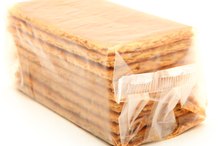What does fact checked mean?
At Healthfully, we strive to deliver objective content that is accurate and up-to-date. Our team periodically reviews articles in order to ensure content quality. The sources cited below consist of evidence from peer-reviewed journals, prominent medical organizations, academic associations, and government data.
The information contained on this site is for informational purposes only, and should not be used as a substitute for the advice of a professional health care provider. Please check with the appropriate physician regarding health questions and concerns. Although we strive to deliver accurate and up-to-date information, no guarantee to that effect is made.
What Is the Nutritional Value of Chex Mix?
Chex Mix is a popular snack for children and adults alike. The original Chex Party Mix is prepared using Chex breakfast cereal and has been a popular recipe for more than 50 years, according to Chex’s website. The popularity of Chex Mix has led to Chex producing a variety of packaged Chex Mix snacks, which vary in nutritional value when compared to each other and to the homemade version.
Calories
The packaged version of Chex Mix is lower in calories than the homemade version. Homemade Chex Party Mix provides 140 calories per half-cup serving, while the packaged version of Traditional Chex Mix provides 120 calories per half-cup serving, according to Chex’s website. You could reduce the calories in the homemade version by using only 3 tbsp. butter instead of 5 tbsp. as the recipe suggests.
- The packaged version of Chex Mix is lower in calories than the homemade version.
Fat
Nutritional Values of Waffles vs. Pancakes
Learn More
The homemade version of Chex Party Mix is also higher in fat than the packaged version. Once again, this can be remedied by reducing the amount of butter you use. Each serving of the homemade version contains 7 g total fat, 2.5 g saturated fat and 0 g trans fat. Each serving of the packaged version provides only 4 g total fat, 1 g saturated fat and 0 g trans fat. According to Medline Plus, reducing saturated fat intake may help to reduce your risk of heart disease.
- The homemade version of Chex Party Mix is also higher in fat than the packaged version.
- Each serving of the homemade version contains 7 g total fat, 2.5 g saturated fat and 0 g trans fat.
Sodium
The homemade version of Chex Party Mix is higher in sodium than the packaged version. Each serving of the homemade version provides 280 mg sodium, while the traditional flavor of the packaged version provides 210 mg per serving. Other flavors of packaged Chex Mix contain different amounts of sodium. The cheddar flavor, for instance, contains only 170 mg per serving, while the hot and spicy flavor provides 190 mg. According to the American Heart Association, diets low in sodium may help to reduce the risk of high blood pressure 1.
- The homemade version of Chex Party Mix is higher in sodium than the packaged version.
- Each serving of the homemade version provides 280 mg sodium, while the traditional flavor of the packaged version provides 210 mg per serving.
Vitamins and Minerals
Nutritional Information in Knorr Vegetable Soup Mix
Learn More
Because the homemade version of Chex Mix contains fortified breakfast cereal, it is higher in vitamins and minerals than the packaged version. Each serving of homemade Chex Mix provides 6 percent of the daily value of vitamin A, 2 percent vitamin C, 6 percent calcium and 30 percent iron. The packaged mix is not fortified and contains only 2 percent of the daily value of iron.
Other Varieties
Chex also makes a Sweet n' Salty line of Chex Mix, as well as a few chocolate flavors of Chex Mix. The Sweet n’ Salty varieties contain more sugar than the traditional version, providing up to 8 g per serving, compared to only 2 g. The chocolate flavors are also higher in sugar, in addition to containing more fat and saturated fat than the traditional version.
Related Articles
References
Writer Bio
Steven Lalevich is a registered dietitian who began writing in 2010 for various websites. He graduated Phi Beta Kappa, earning a Bachelor of Arts in economics from Indiana University where he also completed the didactic program in dietetics. Lalevich is pursuing a Master of Science in human nutrition at the University of New Haven.









